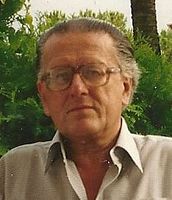Jacques May
| PersonType | Category:Authors of French Works Category:Professors Category:Translators |
|---|---|
| FirstName / namefirst | Jacques |
| LastName / namelast | May |
| MainNamePhon | Jacques May |
| SortName | May, Jacques |
| bio | Jacques May was born in 1927 in Aigle (Switzerland). He first studied Latin and Greek at the University of Lausanne (1949), where the teaching and personality of the Swiss Hellenist André Bonnard (1888-1959), a noted specialist and translator of ancient Greek tragedy, left a lasting impression on him. His early childhood fascination with Alexandra David-Néel (1868-1969) was transformed into a deep interest in "oriental" studies by the great Polish linguist, philologist, and musician Constantin Regamey (1907-1982). In 1949 Jacques May moved to Paris in order to obtain a "certificat d’études indiennes" (1951). At Sorbonne University, the École Pratique des Hautes Études and the Collège de France he studied Sanskrit, Tibetan, and Indian and Buddhist studies under the guidance of extraordinary personalities such as Louis Renou (1896-1966), Marcelle Lalou (1890-1967), Jean Filliozat (1906-1982), Paul Mus (1902-1969) and Paul Demiéville (1894-1979), all of whom impressed him deeply by their impeccable erudition, kindness, and, in the case of Jean Filliozat, administrative, diplomatic, and "political" skills. Of those who studied at the same time in Paris, mention can be made of André Bareau (1921-1993), Paul Horsch (1925-1971), Gerhard Oberhammer (born 1929), and the French Japanologist Bernard Frank (1927-1996). Jacques May could speak endlessly about that "golden age" of French Indology. Returning to Lausanne in 1956, he served as a librarian until 1961 while he prepared his doctoral thesis, which was published in Paris (Adrien Maisonneuve) in 1959 under the title Candrakīrti: Prasannapadā Madhyamakavṛtti (Commentaire limpide au Traité du milieu). This remarkable work consisted of an annotated French translation of the twelve chapters that had been left untranslated by Th. Stcherbatsky, S. Schayer and J.W. de Jong. As noted by P. Demiéville in his foreword, May’s translation was – and remains – a monument of erudition, accuracy and elegance. In 1961 the same Paul Demiéville appointed Jacques May as the editor in chief of the Hôbôgirin, Dictionnaire encyclopédique du bouddhisme d’après les sources chinoises et japonaises, to which he contributed two long articles, Chūdō ([中道] "Middle Way," together with Katsumi Mimaki) and Chūgan ([中觀] "Madhyamaka"). Active as a privat-docent, Jacques May taught Sanskrit and Tibetan in Kyoto, where he stayed first as a grantee of the French Centre National de la Recherche Scientifique (CNRS, 1962-1965) and then as a member of the École française d’Extrême-Orient (1965-1968). |
| YearBirth | 1927 |
| YearDeath | 2018 |
| BornIn | Aigle, Switzerland |
| languageprimary | French |
| IsInGyatsa | No |
| Other wikis |
If the page does not yet exist on the remote wiki, you can paste the tag |

